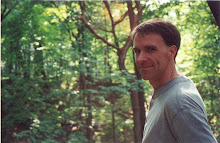Norfolk, Virginia: New York Pavements
Eugene was thin, with a drooping nose above a tiny close-trimmed mustache. He wore oval shades with tortoise shell rims, and his shirt collar was opened to show graying chest hair in which nested a gold chain. On his balding head, he wore a plastic jungle helmet. As he answered, he held his long fingers interlocked or pounded his palms on the wooden arms of his director chair.
"Why would we be isolated?" he responded to my question, "To put it the other way around, I would say if you're isolated, it's your fault. Right down here at the waterside is a very active place. Friday and Saturday nights you can't walk down here it's so crowded with people. The Navy community, which is the largest community here, takes care of its own. This is the largest natural harbor in the world."
"I've seen a lot of changes. I'm one of the few who grew up here. A lot of this area was all woods, just like so much of America. When I was a kid, the drive from Norfolk to Virginia Beach was just a little two-lane road, and you didn't arrive there in fifteen, twenty minutes. It was an all-day thing. I remember my mother making fried chicken and coleslaw and potato salad, putting it in a box with a checkered tablecloth, and we would drive down. And when you got to Virginia Beach, they had two big pavilions with picnic tables. You could go up there and put your basket of food down on the table, walk two blocks away to the water, swim for a couple of hours, and come back, and that table was yours. Nobody had taken it, nobody used it, and your food was all there. So that's a big change.
"My father came here in 1903. 1903, what was here in America? My father had a grocery store. Those were the days when you had a corner grocery that took care of you. You could get credit, that sort of thing. Then the supermarkets started coming along and took all the small men out of business.
"Then we moved to Ghent," he continued. "This was one of the big sections. However, in the fifties I would say, it went down dramatically: the white suburban exodus. Schools closed down. Problems with civil rights. At one time, you took your life in your hands if you would walk through it. And it has come back now. They have million-dollar homes there."
"Now let me ask a question, sir" he said, turning the tables. "You know the history about the museum? That was called the Norfolk Museum of Arts and Sciences, a very small little local place, very undistinguished. Walter Chrysler wanted to give his collection to Newport, Rhode Island. Newport, Rhode Island, said he had too many fakes. He was married to a Norfolk girl, Jean Outland. So he asked Norfolk if they wanted the collection, and they renamed the museum the Chrysler Museum. As a result of that, we probably have one of the nicest small museums in the country, certainly east of the Mississippi. We have the largest collection of Tiffany glass on public display anywhere in the country. Now my opinion is that it's true he had some fakes and had some that were not of quality. However, it's one thing if you take a half a million dollars and you go to a sculpture gallery and say, 'buy me some sculptures.' But he did it all himself. And you know if you do it yourself, you make a few mistakes. That's understandable. But what he achieved is miraculous. They have a bust of Christ done by Bernini, who designed the columns for St. Peter's. I got blessed there by the Pope on Easter Sunday, 1957. Most guys on the ship didn't know what an opportunity they had. When they would show up, the first thing they wanted was a bar and then a girl."
20090527
256 Norfolk, VA: New York Pavements
Subscribe to:
Post Comments (Atom)




No comments:
Post a Comment